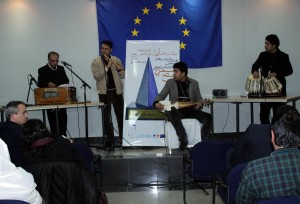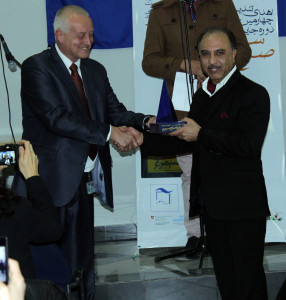O’ harp, I yearn for the Sepahan note
At the concluding ceremony of the Human Rights Week, following the awarding of Simorgh prize statutes to the awardees, Master Waheed Kaacemy, the celebrated singer, composer and music researcher of Afghanistan, gave a concert to mark the 19th anniversary of Armanshahr Foundation/OPEN ASIA’s establishment. He performed several songs and also spoke about the roots of folklore music in Afghanistan. Armanshahr praised the artist at the end of his concert by awarding him a Simorgh statute.
Kaacemy pointed out that many folklore songs in Afghanistan arose from ‘female emotions and sentiments’, i.e. they were ‘created’ by women. For example, there is a well-known song, which is probably in Takhar dialect and its title is: ‘Be my son.’ “It is indeed a lullaby. There are also others such as Nasro Nasro jon; Mulla Mohammad jon; Besmullah jon, and others like them, which are creations of female emotions and sentiments.”
Kaacemy said: “Women do not enjoy a proper status in Afghanistan’s music scene. That is why these songs are gradually brought into the official music scene by men.”
He cited several examples, e.g. ‘mokhta Gul-Mohammad’ in Hezara music, which women have sung as mourning songs, or the ‘falak singing’ by working women in Badakhshan and ‘weer’, a kind of mourning song in the south of Afghanistan and said “nowadays men sing them.”
Master Kaacemy went on to perform some of his songs, which he has either composed for women or women poets have written the lyrics for them.
Armanshahr has previously published a book by Master Kaacemy, entitled ‘Zeer o Bam, a Study of Traditional Music from Badakhshan, Herat and Badgeis.’ The book is one of the few writings about the original music of this geographical region; the Khorassani music, about whose 12 tunes Jalal ad-Din Muhammad Balkhi (a.k.a Mowlana Rumi) has written: O’ harp, I yearn for the Sepahan note / I yearn for the burning pleasant sound of the flute…



